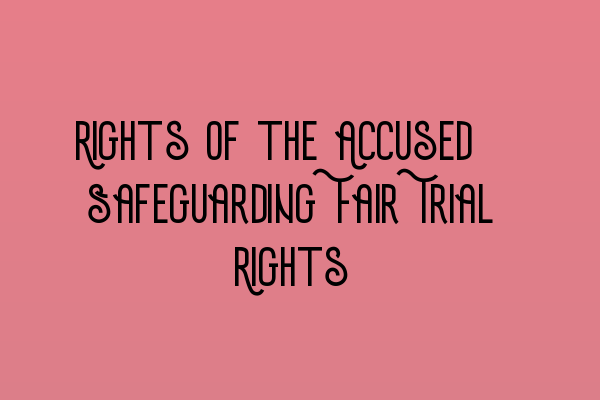Rights of the Accused: Safeguarding Fair Trial Rights
When someone is accused of a crime, it is essential to uphold their rights to ensure a fair trial. The legal system recognizes the importance of these rights and has implemented safeguards to protect the accused. In this article, we will explore the various rights of the accused and their significance in maintaining a fair trial process.
Presumption of Innocence
One of the fundamental principles of criminal law is the presumption of innocence. This means that an accused person is presumed innocent until proven guilty beyond a reasonable doubt. The burden of proof lies with the prosecution to present evidence that establishes guilt. It is crucial to uphold this principle to prevent wrongful convictions and protect the rights of individuals.
Right to Legal Representation
The right to legal representation is another vital aspect of safeguarding fair trial rights. Every accused person has the right to be represented by a solicitor or barrister who can provide legal advice and guidance throughout the trial process. Legal representation ensures that the accused understands their rights, assists in building a defense, and helps navigate the complexities of the legal system.
Prompt Disclosure of Evidence
Another key element in safeguarding fair trial rights is the prompt disclosure of evidence by the prosecution. The accused has the right to access all evidence held by the prosecution, including witness statements, expert reports, and any other relevant material. This allows the defense to adequately prepare their case, challenge the evidence, and present a robust defense.
Right to Remain Silent
The right to remain silent protects individuals from self-incrimination. The accused has the right to refuse to answer questions during police interviews or court proceedings. This right ensures that individuals are not compelled to provide evidence against themselves and helps maintain the fairness of the trial process.
Right to a Fair and Impartial Trial
Every accused person has the right to a fair and impartial trial. This means that the judge and jury must be unbiased and make decisions based solely on the evidence presented in court. The accused also has the right to challenge any bias or prejudice exhibited throughout the trial to ensure the fairness of the proceedings.
Conclusion
Safeguarding the rights of the accused is essential for upholding the principles of fairness and justice in the legal system. The presumption of innocence, right to legal representation, prompt disclosure of evidence, right to remain silent, and the right to a fair and impartial trial are all crucial components in ensuring a fair trial process. If you want to learn more about criminal law and practice, check out our related articles:
- SQE 1 Practice Exam Questions
- SQE 1 Practice Mocks FLK1 FLK2
- SQE 2 Preparation Courses
- SQE 1 Preparation Courses
- SRA SQE Exam Dates
To ensure a fair trial, it is crucial to have a comprehensive understanding of criminal law and practice. At SQE Criminal Law & Practice Law UK, we offer SQE 1 and SQE 2 preparation courses to help aspiring lawyers develop the necessary skills and knowledge. Our courses cover all the key areas of criminal law, including the rights of the accused. Prepare yourself for the SQE exams by enrolling in our courses and accessing our practice exam questions and mocks.
Remember, fair trial rights are the cornerstone of the justice system. Upholding these rights ensures that every accused person receives a fair and just trial. If you have any questions or need guidance regarding criminal law and practice, feel free to reach out to our expert solicitors who are well-versed in the intricacies of criminal law.
